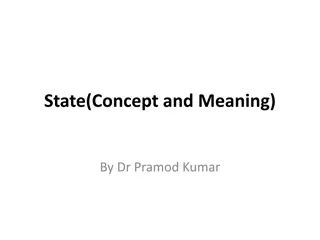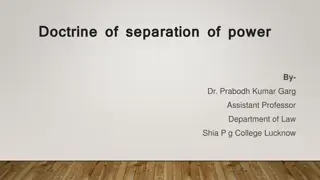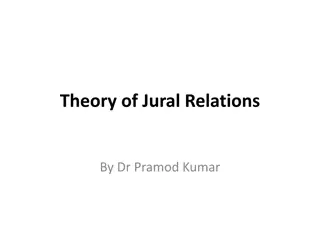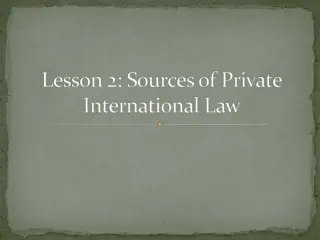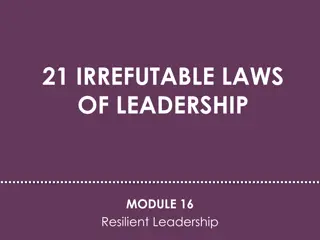Understanding Law: An Introduction by Dr. Pramod Kumar
Law, as explored in "Law: An Introduction" by Dr. Pramod Kumar, encompasses various rules, principles, and systems that regulate human behavior and uphold justice, morality, and order in society. The term "law" holds different meanings across cultures and religions, reflecting diverse legal frameworks and personal laws. Through definitions and insights from jurists like Salmond and Gray, the complexities and nuances of law are highlighted, emphasizing its role in governing societal relationships and ensuring justice.
Download Presentation

Please find below an Image/Link to download the presentation.
The content on the website is provided AS IS for your information and personal use only. It may not be sold, licensed, or shared on other websites without obtaining consent from the author. Download presentation by click this link. If you encounter any issues during the download, it is possible that the publisher has removed the file from their server.
E N D
Presentation Transcript
Law: An Introduction By Dr Pramod Kumar
Law: Introduction The term Law denotes different kinds of rules and Principles. Law is an instrument which regulates human conduct/behavior. Law means Justice, Morality, Reason, Order, and Righteous from the view point of the society. Law means Statutes, Acts, Rules, Regulations, Orders, and Ordinances from point of view of legislature. Law means Rules of court, Decrees, Judgment, Orders of courts, and Injunctions from the point of view of Judges. Law is a broader term which includes Acts, Statutes, Rules, Regulations, Orders, Ordinances, Righteous, Rules of court, Decrees, Judgment, Orders of courts, Injunctions, Tort, Jurisprudence, Legal theory, etc. Justice, Morality, Reason,
Law: Introduction In old English Lagu i.e. law, ordinance, rule, regulation. The term law has different Places/societies at different times (as it is subject to amendments). In Hindu religion law implies Dharma in Muhammadean religion (Islam) it is Hokum ; In Roman its Jus , in French, its Droit in Arabic, Alqanoon; In Persian and Turkish, its Kunoon, in Latin its Legam ; In Philipino its Batas in Albanian language its Ligj in Danish its Lor ; In Dutch its Wet , in Italian its Legge and in Lithuanian its Teise . meanings in different
Law: Introduction Law differs from religion to religion in the sense personal laws viz. Hindu law, Muslim law etc. differ from one another. For instance, A Muslim can have four wives living at a time, but, a Hindu can have only one wife living at a time (Monogamy). If a Hindu male marries again during the life time of first wife he is declared guilty of the offence of bigamy and is Punishable under sec. 494 IPC.
Law: Introduction Generally the term law is used to mean three things: First it is used to mean legal order . It represents the regime of adjusting relations, and ordering conduct by the systematic application of the force of organized political society. Secondly, law means the whole body of legal Percepts which exists in a politically organized society. Thirdly, law is used to mean all official control in a politically organized society. This lead to actual administration of Justice as contrasted with the authoritive material for the Guidance of Judicial action. Law in its narrowest or strict sense is the civil law or the law of the land.
Definitions of law It is very difficult to define the term law. Many Jurists attempted to define the term law. Salmond: - According to salmond the law may be defined as the body of principles recognized and applied by the state in the administration of Justice. John chipman Gray s Definition of Law:- According to Gray, the Law of the State or of any organized body of men is composed of the rules which the courts, that is the judicial organ of the body lays down for the determination of legal rights and duties.
Definitions of law Austin s definition of law:- John Austin (1790-1859) An English Jurists expounded the concept of analytical positivism, making law as a command of sovereign backed by sanction. He developed logically, a structure of legal system in which he gave no Place to values, morality, idealism and Justice. Holland s definition of law:- Thomas Erskine Holland, who followed the Austin s concept and nature of law attempted to define law as law is a General rule of external human action enforced by a political sovereign. Holland also measures or defines law with preference to sovereign devoid of moral, ethical or ideal elements.
Definitions of law H.L.A.Hart :- According to Hart Law is the combination of primary rules of obligations and secondary rules of recognition. John Erskine definition of law:- Law is the command of a sovereign, containing a common rule of life for his subjects and obliging them to obedience. Hans Kelsan s definition of Law : According to Kelsan legal order is the hierarchy of the norms, every norm derive its validity from the superior norm and finally there is highest norm known as grundnorm.
Definitions of law Ihering s Definition of law :- Ihering defines law as the form of Guarantee of the conditions of life of society, assured by state s power of constrain. He says law is a means to an end and end of the law is to serve its purpose which is social not individual. Dean Roscoe Pound s definition of law:- Pound defines law as a social institution to satisfy social wants. He says law is a social engineering, which means that law is a instrument to balance between the competing or conflicting interests. Dias s Definition of law:- Law consists largely of ought (normative) Propositions prescribing how people ought to behave the ought of laws are variously dictated by social, moral, economic, political and other purposes.
Definitions of law Savigin s definition of law:- Van Savigny says that law is not the product of direct legislation but is due to the silent growth of custom or the outcome of unformulated public or professional opinion. He says that law not as a body of rules set by determinate authority but as rules consist partly of social habitat and partly of experience. He says law is found in the society, it is found in custom.
Origin of law Ancient Egyptian law, dating as far back as 3000 BC had a civil code that was probably broken into twelve books. Impartiality by the 22nd century BC, ur-nammu an ancient Sumerian ruler, formulated the first law code consisting of casuistic statements. Around 1960 BC king Hammurabi further developed Babylonian law, by codifying and inscribing it in stone. Hammurabi placed several copies of his law code throughout the kingdom of Babylon. This code is known as the codex Hammurabi.
Origin of law Ancient India and China represent distinct tradition of law, and had historically independent schools of legal theory and practice. The Arthashastra, dating from the 400 BC and the Manusmriti from 100 BCE were influential treatises in India, but this Hindu tradition, along with Islamic law was supplanted by the common law when India became part of British Empire. Malaysia, Brunei, Singapore and Hongkong also adopted the common law. Japan was the first country to begin modernizing its legal system along western lines by importing bits of the French but mostly the German Civil Code. Similarly traditional Chinese law gave way to westernization towards the final years of the dynasty in the form of six private law codes based mainly on the Japanese modal of German law.
Origin of law One of the major legal systems developed during the Middle Ages was Islamic law and jurisprudence. During the classical period of Islamic law and jurisprudence Hawala and institution of law was an early informal transfer system which is mentioned in text of Islamic Jurisprudence as early as the 8th century. Hawala itself later influenced the development of the Aval in French civil law and Avallo in Italian law. Roman law was heavily influenced by Greek teachings.
Functions of law Role of law in Business:- In business law sets guide lines regarding employment regulatory, compliance, even inter office regulations. The rule of law plays an important role in the business world It is the laws that determine what type of business it is to became, and the structure is to be formed. Role of law in Society:- Without law our society would be chaotic, uncivilized mess and anarchy would reign supreme. The role that law has in society is that it creates a norm of conducts in the society we live in laws are made to protect its citizen from harm. It set in way that all citizens are given equal opportunity, protection from harm no matter your race, Gender, religion and social standing.








